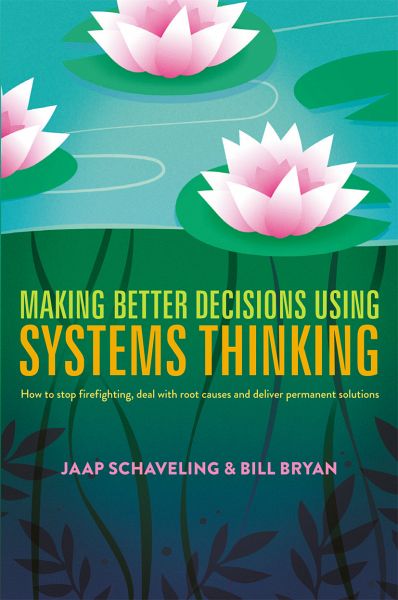
Making Better Decisions Using Systems Thinking (eBook, PDF)
How to stop firefighting, deal with root causes and deliver permanent solutions
Versandkostenfrei!
Sofort per Download lieferbar
32,95 €
inkl. MwSt.

PAYBACK Punkte
16 °P sammeln!
This book provides a framework to help managers go beyond simply fighting fires every day, offering the tools to address the underlying causes of recurring problems and deliver long-term solutions.The most obvious part of any problem is the pain it causes. The desire to end the pain and find a solution - any solution - that will make it go away now is usually so great that it blinds managers to the underlying systemic cause of the problem. The result is that we 'solve' the problem today and then it comes back again tomorrow or next week, again and again.We are only addressing the symptoms but ...
This book provides a framework to help managers go beyond simply fighting fires every day, offering the tools to address the underlying causes of recurring problems and deliver long-term solutions.
The most obvious part of any problem is the pain it causes. The desire to end the pain and find a solution - any solution - that will make it go away now is usually so great that it blinds managers to the underlying systemic cause of the problem. The result is that we 'solve' the problem today and then it comes back again tomorrow or next week, again and again.
We are only addressing the symptoms but never understanding the cause - like picking the flower heads off weeds but not digging them out at the roots.
Schaveling and Bryan offer the insights and tools managers and leaders need to achieve a longer term and more effective approach by stepping back and analysing the system as a whole. And at the heart of any system are human beings - notoriously short-term and pain-averse creatures who will behave in whatever way minimises pain today even at the expense of pain tomorrow.
They show how to detect the behavior patterns that have become engrained in the organisation and which underlie complex situations so that root causes of problems can be identified. Once the system responsible for the problem is understood smarter decisions can be made to devise interventions that solve the core problem instead of wasting energy fighting the symptoms.
The most obvious part of any problem is the pain it causes. The desire to end the pain and find a solution - any solution - that will make it go away now is usually so great that it blinds managers to the underlying systemic cause of the problem. The result is that we 'solve' the problem today and then it comes back again tomorrow or next week, again and again.
We are only addressing the symptoms but never understanding the cause - like picking the flower heads off weeds but not digging them out at the roots.
Schaveling and Bryan offer the insights and tools managers and leaders need to achieve a longer term and more effective approach by stepping back and analysing the system as a whole. And at the heart of any system are human beings - notoriously short-term and pain-averse creatures who will behave in whatever way minimises pain today even at the expense of pain tomorrow.
They show how to detect the behavior patterns that have become engrained in the organisation and which underlie complex situations so that root causes of problems can be identified. Once the system responsible for the problem is understood smarter decisions can be made to devise interventions that solve the core problem instead of wasting energy fighting the symptoms.
Dieser Download kann aus rechtlichen Gründen nur mit Rechnungsadresse in A, B, BG, CY, CZ, D, DK, EW, E, FIN, F, GR, HR, H, IRL, I, LT, L, LR, M, NL, PL, P, R, S, SLO, SK ausgeliefert werden.












